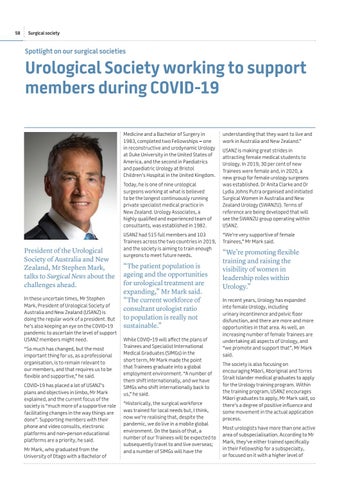58
Surgical society
Spotlight on our surgical societies
Urological Society working to support members during COVID-19 Medicine and a Bachelor of Surgery in 1983, completed two Fellowships – one in reconstructive and urodynamic Urology at Duke University in the United States of America, and the second in Paediatrics and paediatric Urology at Bristol Children’s Hospital in the United Kingdom. Today, he is one of nine urological surgeons working at what is believed to be the longest continuously running private specialist medical practice in New Zealand. Urology Associates, a highly qualified and experienced team of consultants, was established in 1982.
President of the Urological Society of Australia and New Zealand, Mr Stephen Mark, talks to Surgical News about the challenges ahead. In these uncertain times, Mr Stephen Mark, President of Urological Society of Australia and New Zealand (USANZ) is doing the regular work of a president. But he’s also keeping an eye on the COVID-19 pandemic to ascertain the level of support USANZ members might need. “So much has changed, but the most important thing for us, as a professional organisation, is to remain relevant to our members, and that requires us to be flexible and supportive,” he said. COVID-19 has placed a lot of USANZ’s plans and objectives in limbo, Mr Mark explained, and the current focus of the society is “much more of a supportive role facilitating changes in the way things are done”. Supporting members with their phone and video consults, electronic platforms and non-person educational platforms are a priority, he said. Mr Mark, who graduated from the University of Otago with a Bachelor of
USANZ had 515 full members and 103 Trainees across the two countries in 2019, and the society is aiming to train enough surgeons to meet future needs.
“The patient population is ageing and the opportunities for urological treatment are expanding,” Mr Mark said. “The current workforce of consultant urologist ratio to population is really not sustainable.” While COVID-19 will affect the plans of Trainees and Specialist International Medical Graduates (SIMGs) in the short term, Mr Mark made the point that Trainees graduate into a global employment environment. “A number of them shift internationally, and we have SIMGs who shift internationally back to us,” he said. “Historically, the surgical workforce was trained for local needs but, I think, now we’re realising that, despite the pandemic, we do live in a mobile global environment. On the basis of that, a number of our Trainees will be expected to subsequently travel to and live overseas; and a number of SIMGs will have the
understanding that they want to live and work in Australia and New Zealand.” USANZ is making great strides in attracting female medical students to Urology. In 2019, 30 per cent of new Trainees were female and, in 2020, a new group for female urology surgeons was established. Dr Anita Clarke and Dr Lydia Johns Putra organised and initiated Surgical Women in Australia and New Zealand Urology (SWANZU). Terms of reference are being developed that will see the SWANZU group operating within USANZ. “We’re very supportive of female Trainees,” Mr Mark said.
“We’re promoting flexible training and raising the visibility of women in leadership roles within Urology.” In recent years, Urology has expanded into female Urology, including urinary incontinence and pelvic floor disfunction, and there are more and more opportunities in that area. As well, an increasing number of female Trainees are undertaking all aspects of Urology, and “we promote and support that”, Mr Mark said. The society is also focusing on encouraging Māori, Aboriginal and Torres Strait Islander medical graduates to apply for the Urology training program. Within the training program, USANZ encourages Māori graduates to apply, Mr Mark said, so there’s a degree of positive influence and some movement in the actual application process. Most urologists have more than one active area of subspecialisation. According to Mr Mark, they’ve either trained specifically in their Fellowship for a subspecialty, or focused on it with a higher level of
